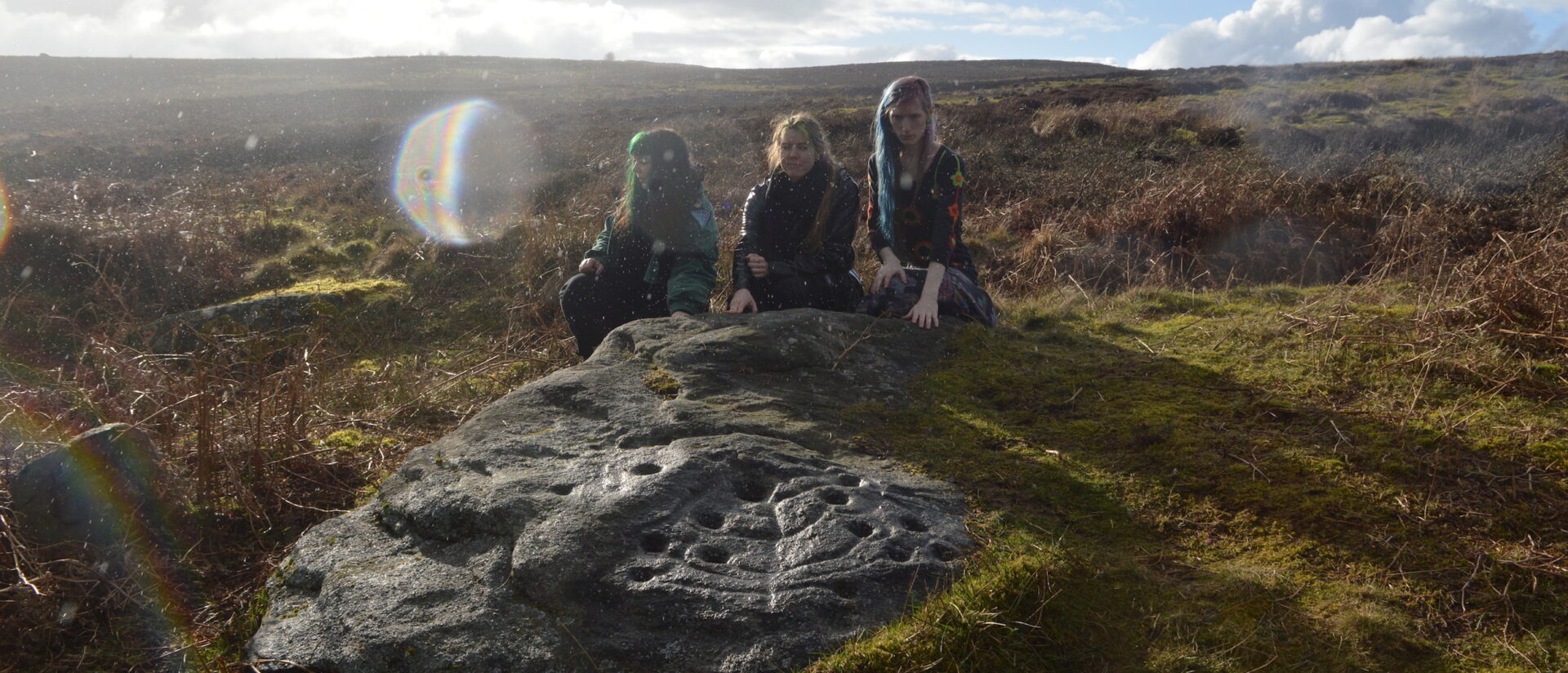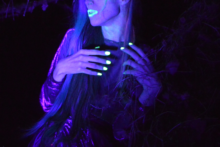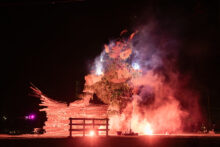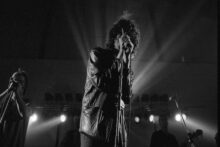Gwretsien Ferch Lisbeth has a complicated relationship with North Wales. She grew up there until the age of 12, living on Anglesey, or Ynys Môn, as well as in Siloh on the edge of Felinheli, the other side of the Menai Strait (Afon Menai) that separates Anglesey from the mainland. After she left, she’d return often to visit her best friend who remained, until in her late teens, there was a painful falling out. “And also, various other sad circumstances around some old family friends.” It was so painful, she says, that “I didn’t go back for years.”
And yet, as she moved away musically from the metal of her youth and towards the experimental music that she’s released from the Leeds underground in the time since, she realised that Wales still held sway. “All of my innermost fantastical, romantic notions about my imagination, a lot of the ethereal music that I make, was all really influenced by the places I grew up. I was haunted by the memory of my experience there.” With Bobby Glew, her bandmate in chaotic free-noise duo Guttersnipe and then-romantic partner, they started returning for occasional visits from 2014. At the final ATP in Prestatyn, in 2016, she also encountered the legendary Welsh experimental rock band Datblygu for the first time.
“I’d never seen [anything] like an alternative Welsh-language band, and that definitely made me feel like that was something that I needed to give some thought to when I had the time,” Ferch Lisbeth recalls. On those trips to Wales, meanwhile, she began considering the Welsh language she’d see written on road signs and shopfronts. “I’d feel a kind of guilt; that I really should learn [the language].” She’d taken Welsh lessons at school until she first moved away “but I’d largely forgotten it apart from the pronunciation… I wanted to be thinking in this language, not just learning how to say a phrase. I wanted it to be something that was in my head all the time and felt natural.” She used textbooks and Duolingo and started watching Welsh-language television. The only thing missing was another human being to converse with.
One day, she was visiting fellow underground Leeds musician Hilary Knott when she noticed some lyrics for one of Knott’s projects that were written in Welsh. Knott was fluent, having lived in North Wales until adulthood. For Ferch Lisbeth, it was not just that she had encountered a fellow Welsh speaker, but a fellow Welsh speaker who was also part of the subculture. When Ferch Lisbeth had lived in Wales, she recalls, “the people who were first language speakers and serious about others speaking the language had a really strong notion of preserving this idea of their traditional culture; If you didn’t want to go to chapel and play rugby and listen to [opera singer] Bryn Terfel, if you were from a different subcultural perspective, there wasn’t really much room for you. So when I discovered that I had a friend who already lived in the same city as me who already spoke the language, along with the shared experience of not fitting into the traditional culture, I was just like, ‘Wouldn’t it be amazing if you and me just spoke Welsh all the time? This fairy language that no one else knows anything about?’”
Ferch Lisbeth’s reconciliation with Welshness would eventually become one of the original drivers of Tristwch Y Fenywod, her new band with Leila Lygad and Sidni Sarffwraig whose gloomy, gothic jewel of a debut album is released this month, and which features entirely Welsh language vocals. It is also, however, the product of a number of other convergent streams.
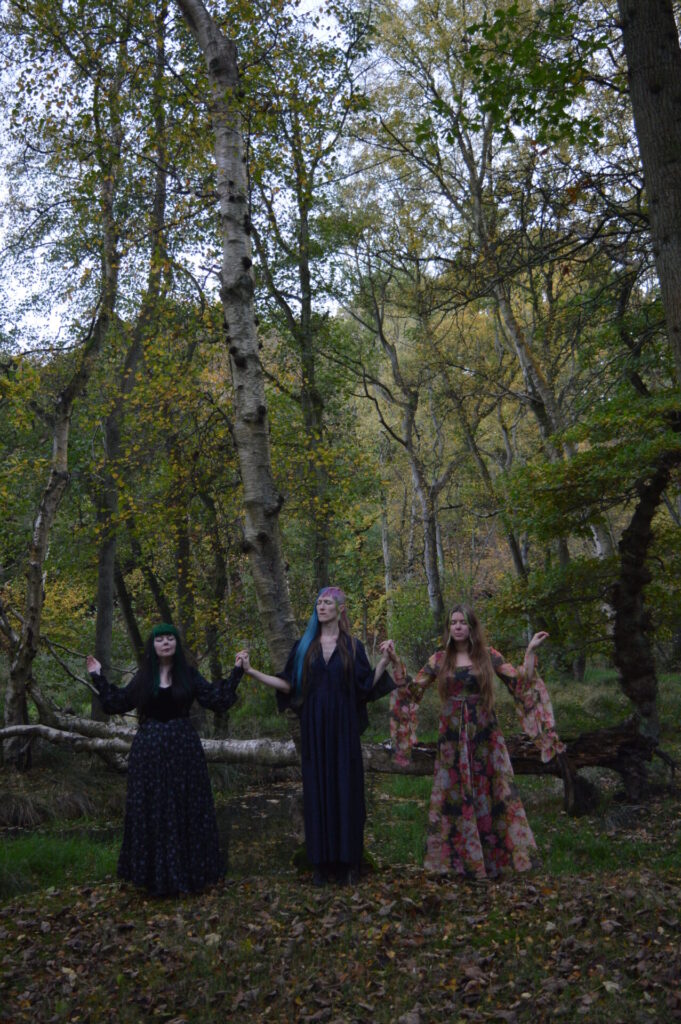
Also of importance, for instance, was a conversation between the three at a Christmas party in 2021, about what new instruments they’d like to pick up if they were to start a new project. Lygad, usually a vocalist in the occult-focused post-industrial duo Hawthonn, chose drums. “A lot of the time when I was watching other bands play, that’s what I would home in on,” she says, citing her longstanding interest in “meditative states”, and her desire to explore them through drumming that – both by design and because of her relative inexperience – would be relatively primitive.
Then there was the philosophy of no wave, “the way that you can separate yourself from some of the expectations about how you’re supposed to treat a certain instrument,” as Sarffwraig puts it. A new project would be the perfect space to apply that to Lygad’s interest in the drums, and for Ferch Lisbeth to begin utilising a self-created instrument consisting of two Russian zithers with a contact mic in the middle, each tuned differently to allow a greater range of notes. “I loved the sound of it, but I’d never used it in a serious music project,” she says. The nascent Tristwch Y Fenywod, however, and its links to her Welsh childhood, provided the perfect opportunity. Thinking about the metal that soundtracked much of her time there, “because a lot of [that music] was very fantasy oriented, you’d occasionally have a part on a metal record where a folk instrument would appear. You’d have a break from the distortion and blast beats, and then this kind of reverie section. It’s not proper folk music, more just this notion of folk in a fantastical context, but I always really liked it, and it fit in quite well with the feelings I had naturally about the landscape and growing up in North Wales.”
Sarffwraig, on bass, is the only member of the band to play her ‘usual’ instrument but is also taking an experimental approach. “I’m really interested in extreme simplicity in the bass,” she explains. With previous all-female projects like The Courtneys and Puberty, “if I played something simple, I’d have people describe my music as ‘shambolic’, or say, ‘They can just barely play their instruments.’ But if a band were all guys, you wouldn’t imagine that they don’t actually know how to play guitar better than that,” she says. “I’m definitely familiar with being judged as if the thing I’m playing is the limit of my abilities. In this project I would say that I’m challenging that more than I ever have.”
Not that their fellow outsider musicians in Leeds have ever placed too much emphasis on technical skill. “I think we all felt quite confident that our immediate community would give us a chance to try this out,” says Ferch Lisbeth. You can, in fact, hear that happening on the Bandcamp demo Yn Fyw Yn Wharf Chambers 12fed Gorffenaf 2022, a recording of their very first live performance and “maybe the fifth or sixth time that I’d ever played drums,” Lygad recalls. That percussion, though simple, is also innovative, employing an electronic drumkit that Ferch Lisbeth had procured during the pandemic following noise complaints from neighbours, loaded with manipulated samples from field recordings – the calls of bats hunting at night, fireworks being let off in an old air raid shelter in the valley between her and Gwretsien’s houses, mediaeval drums and bells. “I’m interested in textural sounds that you can get from significant places or the environment around you, and being able to translate that into rhythmic sound is really exciting,” Lygad adds.
When combined with Sarffwraig’s bass and Ferch Lisbeth’s sprite-like zither and spectral vocals, it creates an immense sonic gloom that recalls the greatest reaches of vintage goth – a style for which all three share a deep love, and which Ferch Lisbeth, again, finds evocative of her youth. “We all love stuff like the first Dead Can Dance record, early Cocteau Twins, Bauhaus, 4AD stuff from the 1980s, and for me that music has always been something that encapsulates the way I feel when I think of the places on Ynys Môn and other parts of North Wales that I grew up around.” The project is at its heart, she says, an exercise in “marrying together my relationship to Wales and also my love of gothic music.”
It was during lockdown that all these strands came together. The pandemic meant that Sarffwraig, who was born in Canada and splits her time between Paris and Leeds, was able to spend more time in the UK than usual. The three of them went on trips to North Wales and walks on nearby Ilkley Moor. “They were very special times,” says Lygad. “Smoking weed in burial chambers, going for walks in the middle of the night, talking about things that we were interested in and getting to know each other in a very intimate way. When we started jamming together, it just seemed like all of these things we were talking about and doing together just clicked.”
It was also, adds Sarffwraig, a time of personal grief. “All three of us were dealing with the loss or serious illness of friends when this band formed,” she says. Courtney Garvin, one of her bandmates in The Courtneys, “got a very severe case of long Covid and has been extremely ill,” leading to the band’s indefinite hiatus. A close friend of both Lygad and Ferch Lisbeth died from cancer. The band’s name translates from Welsh as ‘the sadness of women’, partly in reference to this (but also a reference to their goth lineage as well as “a more universal wider sadness of feminine experience”).
“It seemed like playing music together and speaking directly from quite a vulnerable place was actually the best way to do something creative with those feelings, rather than just grieving. I think we’re all big believers in trying to make something constructive out of a difficult experience,” Ferch Lisbeth says.
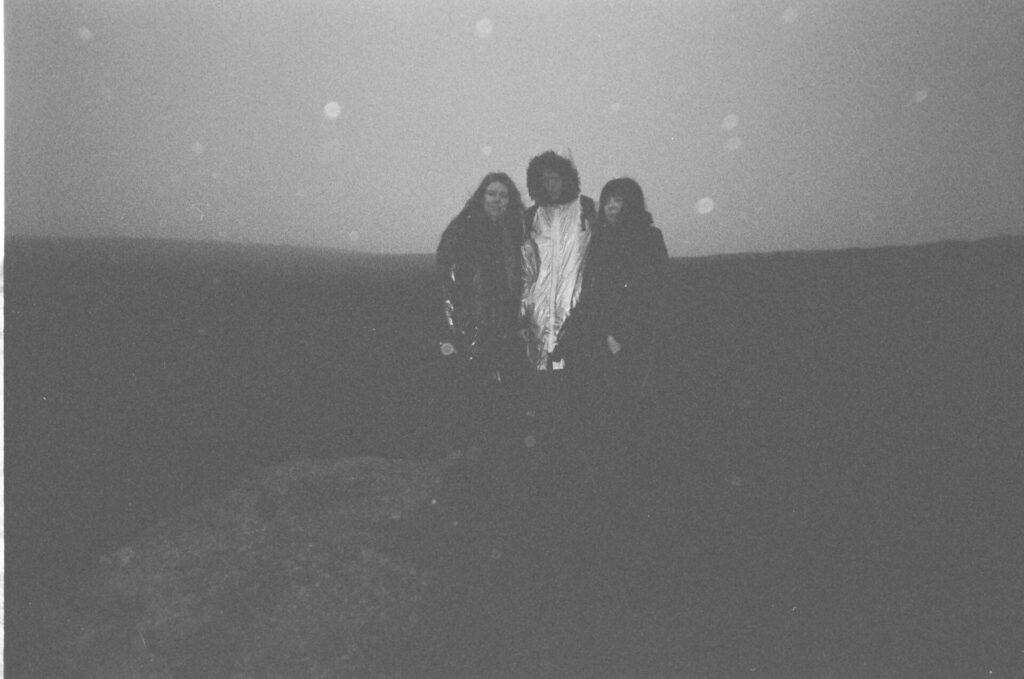
The way Tristwch Y Fenywod operate, particularly on stage, is essentially a transformative ritual. “We do a little gnostic pentagram when we start, to really demarcate that this is the beginning of a process,” says Ferch Lisbeth. They wear costumes sourced from Lygad’s collection of vintage dresses “from when it was in vogue to look like a witch, a mediaeval princess or a Greek goddess or whatever,” as she puts it. Adds Ferch Lisbeth: “In a lot of my other projects, I always have a very specific costume that’s both an indication to me and anyone else watching that ‘what’s being evoked right now is not ambiguous. This is something intentional.’” Ferch Lisbeth has also, notably, taken on pseudonyms across numerous projects – Vymethoxy Redspiders when performing as The Ephemeron Loop, Urocerus Gigas in Guttersnipe. “That’s something else from the culture of being into metal music that I just feel like I will never let go of. I’ve always just really, really enjoyed that transformative aspect of conjuring up a totally new identity. I’m a transsexual as well, so I’m very compelled by the notion that you can conjure up a different personhood and give it life; but you have to have a name to start with.”
This band is no different, where all three have taken on new Welsh pseudonyms. Sarffwraig (usually known as Sydney Koke) translates as ‘Serpent Woman’ as a nod to her love of snakes, while Lygad (normally Layla Legard) translates as ‘the eye’ reflecting both the fact she only has one functioning eye, and referencing Austrian industrial band Zero Kama’s album The Secret Eye of L.A.Y.L.A.H. Ferch Lisbeth, meanwhile, follows a matronymic Welsh naming tradition and translates as ‘Lisbeth’s Daughter.’ “I just really wanted to get into the fantastical and imaginative elements of the project with these names,” she says. “I think it’s really important. I’ve never made music just using my actual name, and I plan to keep it that way. Basically, you can’t be in a band with me unless you use a fake name.”
It’s not hard to zoom out further, and to treat not just Tristwych Y Fenywod’s gigs, but their entire existence as a ritual in transformation. It has certainly, says Ferch Lisbeth, transformed her relationship with Wales.
On one trip back, she noticed that Gwenno – the musician whose album Y Dydd Olaf was one of Ferch Lisbeth’s resources when first learning Welsh – was playing a summer solstice concert on Anglesey. She went, vowing to speak as little English as she could. There, she met Rhys Trimble, a poet, multidisciplinary artist and prolific musician who works in both Welsh and English. They struck up a friendship that lasts today, and he introduced her in turn to his wider community, many of whom had been a part of that great explosion of alternative Welsh-language music that had included Datblygu, the band whose live performance had had such lasting impact in 2016.
“I speak to Rhys like every day in Welsh now. It’s changed my entire relationship to that place. Before it was more like these emotions that had formed in my childhood and a place that I still had this kind of spiritual relationship with, but now I’ve got this active, current relationship with this community of people, [many of whom] are neurodivergent and celebratory of queer people,” she says. “It led to me having a personal relationship with a whole community of alternative people, and given me so many different perspectives on what it means to be a Welsh language speaker and an alternative person in that culture.”
Tristwch Y Fenywod’s self-titled debut album is released via Night School Records on 30 August. They perform on the same day as part of this year’s Supersonic Festival

